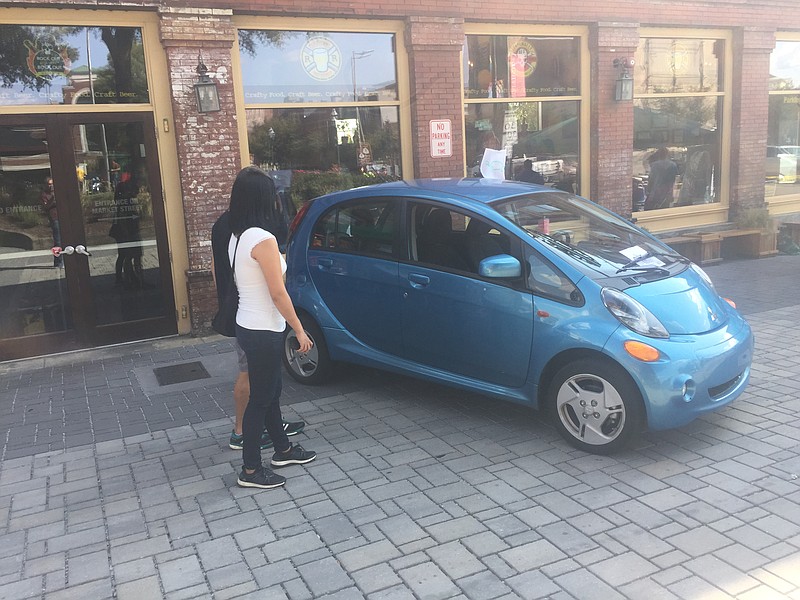Steve Hollingsworth wanted an economic and environmentally friendly vehicle to get around Chattanooga after he retired.
So in June 2015, the 66-year-old retiree decided to buy his first all-electric car - a 2014 Mitsubishi MiEV which he bought for about $18,000. After taking advantage of the $7,500 federal tax credit for buying an all-electric vehicle, Hollingsworth paid the equivalent of $11,500 for his subcompact vehicle, which he says is cheaper for maintenance and less expensive to "fuel" with electricity rather than gasoline in a conventional combustion-turbine engine vehicle.
"We thought (buying the MiEv) was an incredible deal," Hollingsworth said during a kickoff event for Chattanooga's Drive Electric Week this week. "I believe in conservation and it is a morally good and right thing to consume less fossil fuels, but we also figured this would save us money in the long run. If you get past the range anxiety, then you realize that electric cars are really great cars."
Hollingsworth drives one of more than 1 million battery-powered cars that have been sold by automakers around the globe over the past decade. Although electric cars still comprise only a tiny share of all vehicles on the road, they are gaining favor, especially in cities like Chattanooga that have long promoted electric cars and continue to add more charging stations.
The Tennessee Valley Authority built an electric vehicle test track in Chattanooga in the 1970s and a local company, Advanced Vehicle Systems, assembled some of the first all-electric shuttle buses in the country, some of which still operate on CARTA's downtown shuttle routes in Chattanooga.
CARTA continues to promote electric vehicles both with free solar-powered charging stations across the Chattanooga area and with support for an electric car sharing platform known as Green Commuter.
Green Commuter offers all-electric Nissan Leafs for $7 an hour, or $45 a day, to encourage motorists to test battery-powered cars in Chattanooga. EPB also has lent support to the program to drop the cost of some rentals to only $4 an hour, or $32 per day.
CARTA also is using a $3 million grant from TVA to support the electric car sharing program.
Mel Honeycutt, program manager for Green Commuter, said the program has more than 300 active members, who pay an initial $25 but then get the first 30 hours of driving time for free. Green Commuter has had nearly 2,000 rentals so far this year in Chattanooga.
Philip Pugliese, transportation system planner for CARTA, said in the same period more than 3,500 electric vehicles have charged across the 20 charging sites in the area that CARTA has installed.
"CARTA is pleased to have promoted electric vehicle charging access through the development of an expanded public charging network that also is shared with Green Commuter," Pugliese said. "CARTA has generated over 90 megawatts of solar electric power as part of the project in renewable energy that has been supplied to the grid."
Electric cars, when recharged with energy generated from renewable sources, offer a cleaner source of energy than traditional gas-powered vehicles.
Chattanooga was one of more than 100 cities across the country where electric vehicle owners and their neighbors conducted "tailpipe-free" tailgate parties over the weekend.
According to the Chattanooga Drive Electric and the Cherokee Group of the Sierra Club, the miles per gallon equivalent of the typical battery-powered vehicle is more than 100 mpg.
Hollingsworth said the extra costs on his monthly electric bill for charging up his electric car at night "gets lost in the noise" and doesn't dramatically boost his power bill.
But Hollingsworth said he only uses his electric car as an urban car and typically gets 60 miles worth of driving per charge. He leaves his longer trips and out-of-town travel to his diesel-powered BMW.
For those making longer trips, recharging stations are critical to extending the range of electric cars.
But some of the early ventures with electric charging stations proved costly for investors and taxpayers. ECOtality Inc., which received $99.9 million in federal stimulus grants in 2009, built a nationwide network of recharging stations under the Blink name through partnerships with a variety of businesses, utilities and government agencies, including Cracker Barrel and the Oak Ridge National Laboratory. But the company filed for bankruptcy in 2013.
Usage of such charging stations will grow as the fleet of battery-powered cars on the road increases. And with more charging stations, the ease of driving electric cars, even for intercity travel, is improving.
Duane Leffel, a retired Nissan employee who lives in Franklin, Tenn., traveled four years ago from coast to coast in an all-electric Leaf assembled in Smyrna, Tenn., and achieved distinction in the Guinness Book of Records for making the longest trip to that point in an all-electric vehicle.
To make the 44-day trip from Charleston, S.C., to San Francisco, he used a variety of charging stations, including a mobile unit he plugged into air conditioning electric sockets in hotels across the country.
"There are plenty of public charging stations east of the Mississippi River, but it was more of a challenge west of Memphis," he said during a weekend visit to Chattanooga.
Leffel chronicled his trip in a book scheduled for release in January known as "Kicking Gas and Taking Charge."
The retired Leaf executive said his trip proves that anyone can travel across the country in an electric vehicle.
"I really had to plan my trip, but it is getting easier all the time and therefore I think we're going to continue to see more and more electric vehicles on the road," he said. "The batteries are getting better; we're getting more charging stations, and people are getting more familiar with electric cars. I think you're going to see a lot of change in the next five years."
Contact Dave Flessner at dflessner@timesfreepress.com or at 423-757-6340.
